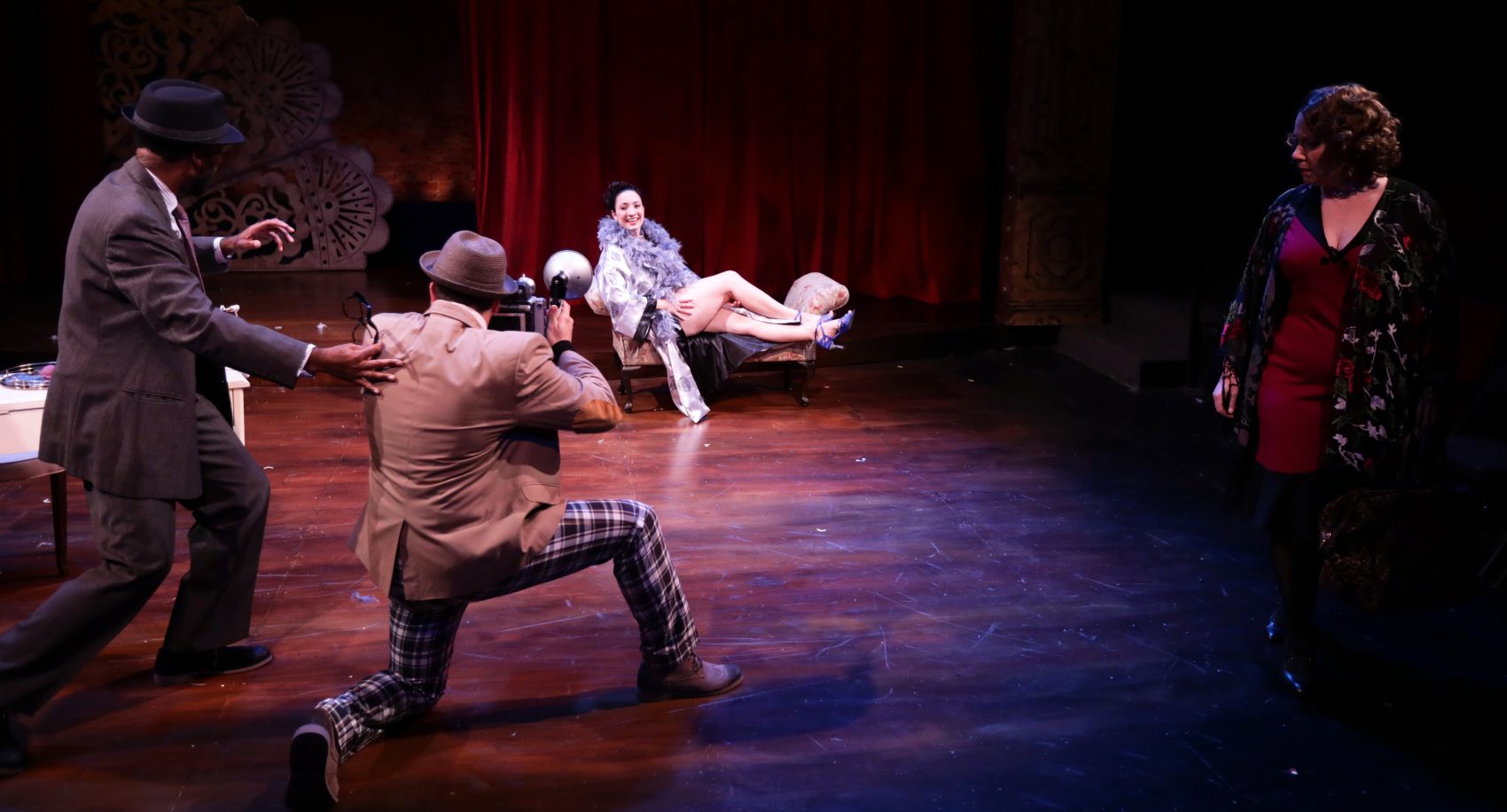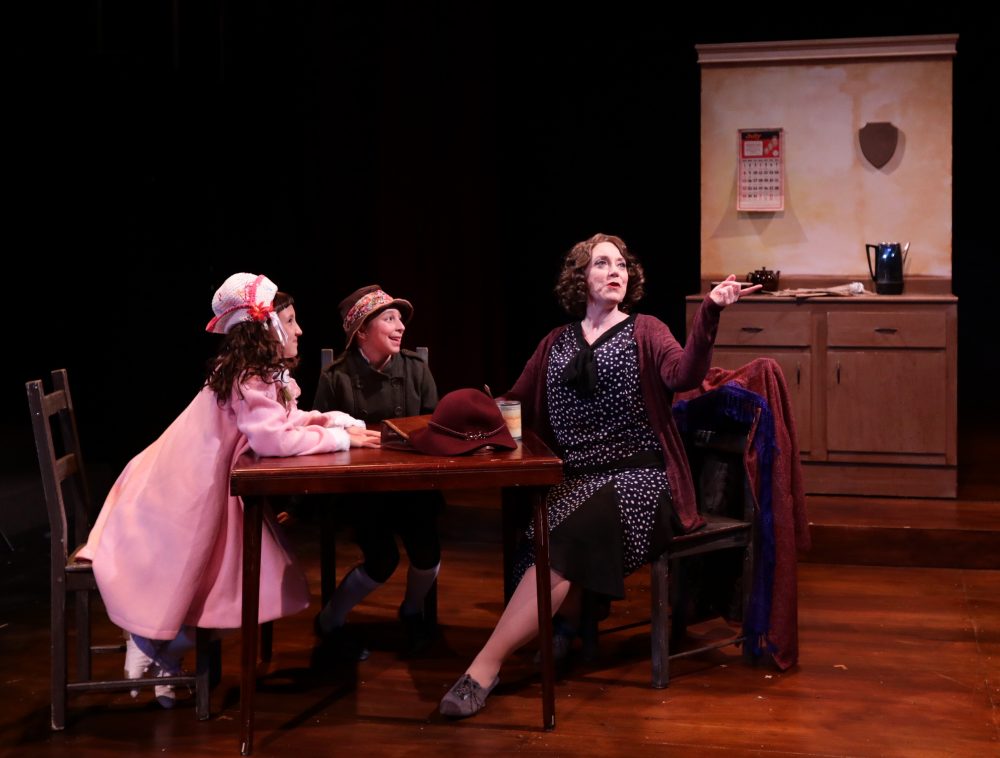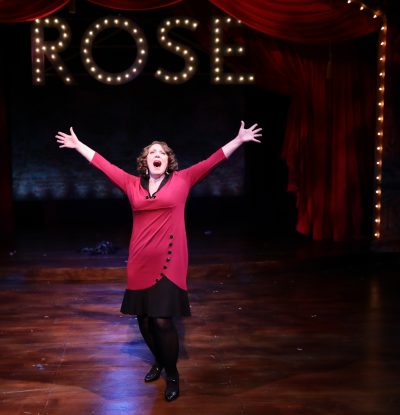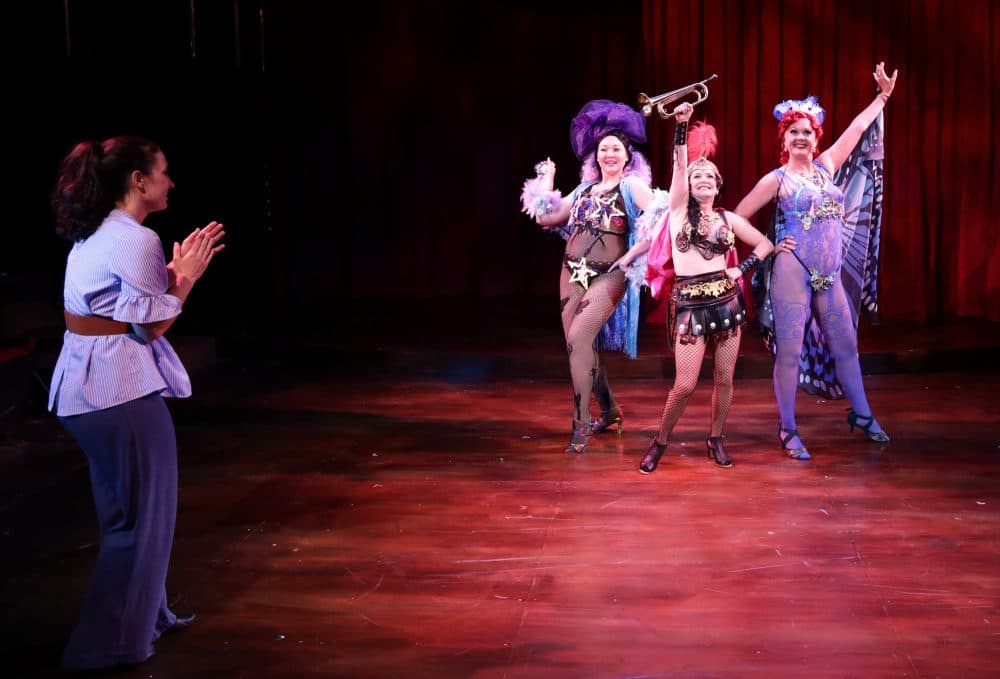Advertisement
Review
Leigh Barrett Excels As Mama Rose, The Stage Mom From Hell, In Lyric Stage's 'Gypsy'

The Lyric Stage Company of Boston kicks off its new season with a bracing production of the Jule Styne/Stephen Sondheim musical “Gypsy.” The show runs close to three hours, but under the direction of Rachel Bertone, who also choreographs, it rushes by with buoyant energy.
Gypsy Rose Lee was a famous striptease artist, but the stage musical adapted from her 1957 memoir places the spotlight square on her mother, Mama Rose (Leigh Barrett), whose unquenchable thirst for vaudeville fame — together with her larger-than-life personality — made her a force to contend with. The problem with Mama Rose’s ambitions was twofold: She was trying to achieve fame through her daughters (chiefly the elder, June), which is as sure a recipe for disaster as for drama; also, by the time June and Louise (Gypsy’s real name) were old enough to start hoofing on stage, vaudeville’s shine was fading.
From the play’s opening moments it’s clear which daughter is Mama Rose’s favorite. Baby June (Margot Anderson-Song) is far more ornately dressed than her younger sister Louise (Cate Galante). Baby June is also far more comfortable and assured on stage, but who can blame Louise for lagging behind or singing in a fading whisper when Mama Rose is forever lurking just off stage to berate her?

It’s not that Mama Rose is a monster. She’s a stage mother from hell, but she also finds a few moments of affection and a few words of praise for Louise. However, her priorities are clear from the get go: Nothing is going to stop her ushering her child to stardom, and she’ll do just about anything to clear the path of obstacles. That includes burning through three marriages, stealing from her father (a restrained Remo Airaldi), forming her own small troupe of young performers to take on the road, and recycling the same basic material for shows that endlessly tread the same well-worn ground. (Bertone winks at us here, her choreography gleefully echoing earlier numbers as the show progresses.)

Years flash by, and the kids grow up in a nifty mid-number transformation (“Baby June and Her Newsboys”). It’s Louise’s birthday (and she’s now played by Kirsten Salpini), but she’s not the only one growing up; all the kids are getting older, including not only June (Kira Troilo) but also the sisters’ male co-stars Yonkers (David Alea) and Tulsa (Brady Miller). Mama Rose, characteristically, refuses to bow to time; nobody in this show, she crisply informs the kids, is officially older than 10.
Meantime, Mama Rose continues on the same delusional trajectory, defrauding landlords and wigmakers along the way. What’s she going to do when her beloved Baby June begins yearning for a more substantial acting career, to say nothing of developing feelings for Tulsa, who is now a dashing young man?
Not that Mama Rose has any real grounds for disapproving anyone’s romantic lives. She’s picked up a lover of her own along the way — a candy salesman named Herbie (Steven Barkhimer) who has resurrected his former career as a theatrical agent in order to support the girls’ act. He’s no mere sugar daddy; Herbie, smitten with Mama Rose, gives the troupe his all, and he stands by Rose despite her misgivings about the prospect of marriage.
“Gypsy” is a story about finding one’s destiny in the most unusual places. In the case of its title character, that means stumbling into a stint at a burlesque house, a situation that horrifies Mama Rose (she does have her standards, after all!). It’s here that things really change, though, because it’s Louise who takes the pragmatic view that a gig is a gig, and if it pays why not take it?
Here’s where the already-zippy show leaps into overdrive. Airaldi reappears as the perpetually fretful owner of the burlesque house; Shannon Lee Jones rocks the house as the earthily good natured Tessie, clad in a slinky, sheer, butterfly-themed gown; Jordan Clark lights the place up, literally, and to hilarious effect, as Electra; and Kathy St. George just about steals the show as the resident practitioner of “gladiator ballet,” looking like she just burst out of the pages of a smutty mirror-universe version of “The Iliad.”

This brash cadre are worldly but decent at heart, and they seem to reassure Mama Rose that her troupe’s morals need not be sullied by the two-week engagement. That delicate rationalization unravels in a hurry when the burlesque show’s main attraction gets herself arrested; Mama Rose’s ambition overrides her good sense and she pushes her virginal daughter into subbing for the detained stripper. Unlikely as it might seem, though, Louise finds a gimmick of her own, discovers a talent for striptease, and is reborn as the legendary Gypsy. File this under Unintended Consequences, or maybe in the Careful What You Wish For section; either way, the moment slips by too quickly and though Salpini gives the moment a charming turn one might wish that the book didn’t gloss over Gypsy’s inaugural appearance with such brevity.
The creative team at the Lyric run with the production. Bertone casts a fond eye back at vaudeville, but knows how to jazz up nostalgia and turn it into sheer fun. Her choreography shows off the cast members’ dancing skills, letting their talents shine. Dan Rodriguez’ music direction makes the six-person live orchestra sound twice as large.
The cast are equally creative and committed. Brady Miller’s dance prowess is particularly graceful and energetic, and Anderson-Song, a natural for the stage, is perfect as Baby June. Barrett’s rich voice fills the theater as forcefully as Mama Rose’s outsized personality. Salpini’s performance almost sneaks up on the audience; she skillfully enlivens the script’s gradual reveal of Louise as more than a long-suffering second banana. She’s resourceful, strong, and ultimately self-possessed. Mama Rose might be the star of the piece, but Louise — aka Gypsy — becomes the hero.
Of this show’s many triumphs, the trickiest is to manage an especially complex mother-daughter relationship, and Bertone manages this movingly. The show’s book, by Arthur Laurents, suffers from a few weak narrative links, but you hardly notice them in this perfect storm of song, dance, comedy, drama and design.
The Lyric Stage Company's production of “Gypsy” continues through Oct. 8.